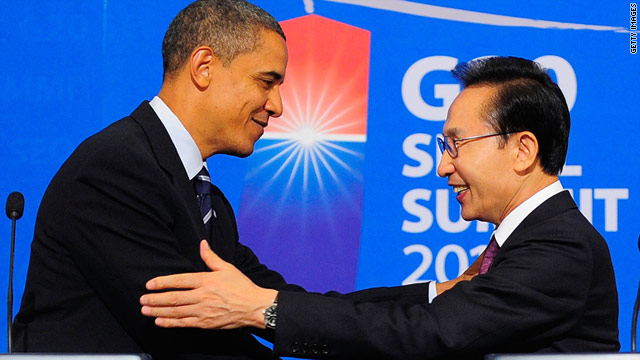Scammer
Banned

U.S. President Barack Obama shakes hands with South Korean President Lee Myung-bak during a joint press conference after their meeting during the G-20 summit in Seoul on November 11.
President Barack Obama will make a statement Saturday morning about a new U.S. trade agreement with South Korea, the White House said.
The agreement, which must be ratified by Congress, strengthens economic ties between Washington and Seoul at a time when the longtime U.S. ally faces an increasingly hostile northern neighbor.
If ratified, the agreement would eliminate tariffs on over 95% of industrial and consumer goods within five years.
"It is a strong, balanced package," a senior administration official said during a conference call with reporters, Friday. "It is a win-win both for Koreans and for Americans."
The U.S. International Trade Commission has estimated that the tariff cuts alone in the U.S.-Korea trade agreement will increase exports of American goods by $10 billion to $11 billion, and the White House touted the agreement's job-supporting potential.
"This is an important step forward to expand the reach of American exports, which will help create more American jobs," said House Majority Leader Steny Hoyer, D-Md. as part of a statement issued by the White House. "It also helps strengthen our ties to a dependable democratic ally that fosters prosperity and stability in Asia and enhances our economic and national security."
The first version of the agreement was negotiated in 2007 by the Bush administration, but floundered in Congress. The accord comes just weeks after negotiators failed to reach a deal at the G-20 summit, forcing Obama to walk away from the conference without a landmark agreement.
A long-running dispute over U.S. access to Korea's auto and beef markets was largely responsible for the failure. But those issues have since been resolved.
The new agreement calls for South Korea to reduce its tariff on U.S. auto imports from 8% to 4%, and fully eliminate it in the fifth year.
Meanwhile, the 2.5% U.S. tariff on auto imports will remain in place until the fifth year, instead of being immediately eliminated as specified in the 2007 agreement.
The deal sparked an almost immediate response from Public Citizen, a liberal group that characterized the agreement as a "Bush NAFTA-style trade deal."
"Choosing to advance Bush's NAFTA-style Korea free trade agreement rather than the new trade policy President Obama promised during his campaign will mean more American job loss," Lori Wallach, the director of Public Citizen's Global Trade Watch said in a statement.
But a number of business leaders praised the deal.
"The resulting agreement provides greater clarity and transparency by affirmatively addressing the issues surrounding non-tariff and tariff barriers," Ford Motor Co. CEO Alan Mulally said as part of a statement released by the White House.
